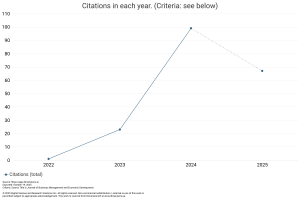Nudge Concept and its Controversy - The Behavioural Economics Applications
DOI:
https://doi.org/10.59653/jbmed.v1i03.183Keywords:
Behavioural economics, Nudge theory, architectures, libertarian paternalismAbstract
Over the decades, the nudge idea of behavioural economics (BE), disseminated by Thaler & Sunstein (2008) in their well-known book, has generated controversial views among many academics and scientists around the world. As an application area of behavioural economics (BE), nudge theory and the nudge concept has found many supporters, but at the same time has generated controversial views among many academics and scholars around the world, especially with regard to its broad definition, decision-making architectures, and libertarian paternalism concepts. Interestingly, this concept has attracted a lot of attention from key government officials, especially in the UK and the US, to change the behaviour of the population to a significant extent. The aim of this study is to discuss the nudge concept and its application to current situations and also to shed light on the critical views of this concept. It was found that this concept, although it has many critics, is considered a useful tool to change the behaviour of people or customers without using coercive measures to achieve the desired result.
Downloads
References
Baldwin, R. (2014). From Regulation to Behaviour Change: Giving Nudge the Third Degree. Modern Law Review. https://doi.org/10.1111/1468-2230.12094
Barton, A., & Grüne-Yanoff, T. (2015). From Libertarian Paternalism to Nudging—and Beyond. In Review of Philosophy and Psychology. https://doi.org/10.1007/s13164-015-0268-x
Behavioral Insights Team. (2020). Using behavioural insights to create a Covid-19 text service for the NHS. https://www.bi.team/blogs/using-behavioural-insights-to-create-a-covid-19-text-service-for-the-nhs/
Benartzi, S., Beshears, J., Milkman, K. L., Sunstein, C. R., Thaler, R. H., Shankar, M., Tucker-Ray, W., Congdon, W. J., & Galing, S. (2017). Should Governments Invest More in Nudging? Psychological Science. https://doi.org/10.1177/0956797617702501
Chapman, A. (2014). Nudge theory – Improving Workplace Performance. https://www.businessballs.com/improving-workplace-performance/nudge-theory/
Dolan, P., Hallsworth, M., Halpern, D., King, D., & Vlaev, I. (2010). MINDSPACE: influencing behaviour for public policy.
Earl, P. E. (2018). Richard H. Thaler: A Nobel Prize for Behavioural Economics. Review of Political Economy, 30(2), 107–125. https://doi.org/10.1080/09538259.2018.1513236
Ebert, P., & Freibichler, W. (2017). Nudge management: applying behavioural science to increase knowledge worker productivity. Journal of Organization Design. https://doi.org/10.1186/s41469-017-0014-1
Egan, M. (2017). An Analysis of Richard H. Thaler and Cass R. Sunstein’s Nudge: Improving Decisions about Health, Wealth and Happiness. CRC Press.
Frey, B. S., & Gallus, J. (2016). Beneficial and Exploitative Nudges. In Nudging - Possibilities, Limitations and Applications in European Law and Economics. https://doi.org/10.1007/978-3-319-29562-6_2
Goodwin, T. (2012). Why We Should Reject “Nudge.” Politics. https://doi.org/10.1111/j.1467-9256.2012.01430.x
Government, U. (2010). About us - Behavioural Insights Team. https://www.gov.uk/government/organisations/behavioural-insights-team
Gravert, C, & Nobel, N. (2019). Applied Behavioral Science an Introductory Guide.
Gravert, C. (2019). Behavioral Economics and nudging – same difference? https://impactually.se/behavioral-economics-and-nudging-same-difference/
Green, E. (2020). Coronavirus highlights how ‘nudge theory’ could address hand hygiene and other challenges in healthcare. https://www.ns-healthcare.com/analysis/coronavirus-nudge-theory-hygiene-challenges-healthcare/
Hausman, D. M., & Welch, B. (2010). Debate: To nudge or not to nudge. Journal of Political Philosophy, 18(1), 123–136. https://doi.org/10.1111/j.1467-9760.2009.00351.x
Hollands, G. J., Shemilt, I., Marteau, T. M., Jebb, S. A., Kelly, M. P., Nakamura, R., Suhrcke, M., & Ogilvie, D. (2013). Altering choice architecture to change population health behavior: a large-scale conceptual and empirical scoping review of interventions within micro-environments. BMC Public Health. https://doi.org/10.1186/1471-2458-13-1218
John, P. (2018). How Far to Nudge? In How Far to Nudge? https://doi.org/10.4337/9781786430557
Kahneman, D. (2011). Thinking fast, thinking slow. In Interpretation, Tavistock, London.
Kosters, M., & Van der Heijden, J. (2015). From mechanism to virtue: Evaluating Nudge theory. Evaluation. https://doi.org/10.1177/1356389015590218
Kroese, F. M., Marchiori, D. R., & De Ridder, D. T. D. (2016). Nudging healthy food choices: A field experiment at the train station. Journal of Public Health (United Kingdom). https://doi.org/10.1093/pubmed/fdv096
Le Grand, J., & New, B. (2015). Government paternalism: Nanny state or helpful friend? Princeton University Press.
Levy, N. (2019). Nudge, Nudge, Wink, Wink: Nudging is Giving Reasons. Ergo, an Open Access Journal of Philosophy. https://doi.org/10.3998/ergo.12405314.0006.010
Lin, Y., Osman, M., & Ashcroft, R. (2017). Nudge: concept, effectiveness, and ethics. Basic and Applied Social Psychology, 39(6), 293–306.
Ly, K., & Soman, D. (2013). Nudging around the world (Research Report Series). Retrieved from the Rotman School of Management, University of Toronto:(Link).
Marteau, T. M., Ogilvie, D., Roland, M., Suhrcke, M., & Kelly, M. P. (2011). Judging nudging: can nudging improve population health? Bmj, 342. https://doi.org/10.1136/bmj.d228
Mills, C. (2013). Why nudges matter: A reply to goodwin. Politics. https://doi.org/10.1111/j.1467-9256.2012.01450.x
Mills, S. (2020). Coronavirus Crisis Putting UK Nudging to the Test. https://www.socialsciencespace.com/2020/03/coronavirus-crisis-putting-uk-nudging-to-the-test/
Moseley, A., & Stoker, G. (2013). Nudging citizens? Prospects and pitfalls confronting a new heuristic. Resources, Conservation and Recycling. https://doi.org/10.1016/j.resconrec.2013.04.008
O’Leary, J. & T. M. (2017). Beyond carrots and sticks How state and local governments can use nudge thinking to improve outcomes. Deloitte.
Oxford Learners Dictionaries. (2020). Nudge terms and definition. https://www.oxfordlearnersdictionaries.com/definition/english/nudge_1
Rachlin, H. (2015). Choice architecture: A review of why nudge: The politics of libertarian paternalism. Journal of the Experimental Analysis of Behavior. https://doi.org/10.1002/jeab.163
Radio, B. B. C. 4. (2013). Analysis: Nudge theory in practice. Current Affairs.
Richard Thaler, by H., Sunstein ROBERT SUGDEN Taylor, C. R., & Sugden, R. (2009). On Nudging: A Review of Nudge: Improving Decisions About Health, Wealth and Happiness. Int. J. of the Economics of Business International Journal of the Economics of Business. https://doi.org/10.1080/13571510903227064
Saghai, Y. (2013). Salvaging the concept of nudge. Journal of Medical Ethics. https://doi.org/10.1136/medethics-2012-100727
Samson, A., & Gigerenzer, G. (2016). The Behavioral Economics Guide 2016. White Paper. https://doi.org/10.13140/RG.2.1.3623.2803
Sande, V. (2016). Nudge fudge or crystal clear? Investigating nudges and how they work. Oslo and Akershus University College of Applied Sciences.
Santos Silva, M. (2022). Nudging and Other Behaviourally Based Policies as Enablers for Environmental Sustainability. In Laws (Vol. 11, Issue 1). https://doi.org/10.3390/laws11010009
Sunstein, C. R. (2016). Do people like nudges? In Administrative Law Review. https://doi.org/10.2139/ssrn.2604084
Sunstein, C. R. (2017). Nudges that fail. Behavioural Public Policy. https://doi.org/10.1017/bpp.2016.3
Tagliabue, M., Squatrito, V., & Presti, G. (2019). Models of Cognition and Their Applications in Behavioral Economics: A Conceptual Framework for Nudging Derived From Behavior Analysis and Relational Frame Theory. Frontiers in Psychology. https://doi.org/10.3389/fpsyg.2019.02418
Thaler, R. H., & Sunstein, C. R. (2003). Libertarian paternalism. American Economic Review. https://doi.org/10.1257/000282803321947001
Thaler, R. H., & Sunstein, C. R. (2008). Nudge: Improving decisions about health, wealth, and happiness. In Nudge: Improving Decisions about Health, Wealth, and Happiness. https://doi.org/10.1016/s1477-3880(15)30073-6
Thaler, R. H., & Sunstein, C. R. (2021). Nudge: The final edition. Yale University Press.
Wendel, S. (2016). Behavioral Nudges and Consumer Technology. In Nudge Theory in Action. https://doi.org/10.1007/978-3-319-31319-1_5
Downloads
Published
How to Cite
Issue
Section
License
Copyright (c) 2023 Muhammad Masyhuri

This work is licensed under a Creative Commons Attribution-ShareAlike 4.0 International License.
Authors who publish with this journal agree to the following terms:
- Authors retain copyright and grant the journal right of first publication with the work simultaneously licensed under a Creative Commons Attribution-ShareAlike that allows others to share the work with an acknowledgement of the work's authorship and initial publication in this journal.
- Authors are able to enter into separate, additional contractual arrangements for the non-exclusive distribution of the journal's published version of the work (e.g., post it to an institutional repository or publish it in a book), with an acknowledgement of its initial publication in this journal.
- Authors are permitted and encouraged to post their work online (e.g., in institutional repositories or on their website) prior to and during the submission process, as it can lead to productive exchanges, as well as earlier and greater citation of published work (See The Effect of Open Access).





























